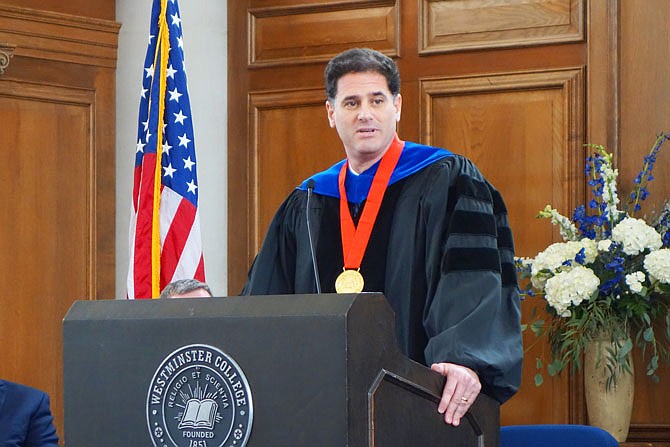Israel's ambassador to the U.S. has a connection to Winston Churchill's Iron Curtain speech, famously delivered in Fulton.
"He wrote it while he was on vacation in Miami Beach, Florida, which is where I was born and raised," Ambassador Ron Dermer said.
Dermer delivered Sunday's keynote speech of the Churchill Fellows Weekend at Westminster College. While Dermer's connection to Churchill might be tenuous at best, Churchill's connection to Israel and the Jewish people were anything but, Dermer said.
"Winston Churchill was a faithful friend of Jews," Dermer said.
Specifically, Churchill was a lifelong, strong supporter of the formation of a Jewish state, he explained. That dream was finally achieved in 1948, 70 years ago.
"Churchill would be proud of the remarkable state we have accomplished," Dermer added.
The connection began early: When Churchill's father died, his father's friends looked after the young Churchill. At 24, Churchill applauded writer Emile Zola's condemnation of antisemitism. In 1904, four years after he entered Parliament, Churchill opposed a bill that would restrict the arrival of Jewish immigrants. In 1908, he referred to himself as a full supporter of Zionism, Dermer said, and in 1911, Churchill sent troops to stop anti-Jewish riots in Wales.
"Churchill's sympathies stayed consistent even when he changed parties," Dermer said. "He thought they were true partners in advancing the future."
Those sympathies remained constant throughout his life, Dermer said.
As World War I marched to its close, the British government issued the Balfour Declaration in 1917. This statement voiced support for the establishment of a "national home for the Jewish people" in Palestine. Palestinian leaders and some in the British government opposed the declaration, but Churchill was a firm supporter, according to Dermer.
Despite that support, Dermer said, Churchill and all the allies could have done more for Jews during World War II.
"The world's government, almost without exception, did nothing to save Jews," he said.
Churchill's focus on winning the war had the side effect of helping end the slaughter of Jews during the Holocaust, but being welcoming of Jewish refugees and taking direct actions earlier would have been helpful, he added. Churchill's own war cabinet were anti-Zionist, and others in the government were openly anti-Semitic.
"Only in the hands of a Jewish state is winning the war and saving the Jews the same thing," Dermer said.
However, from the beginning, Churchill soundly condemned Nazi Germany's atrocities against Jews, even turning down an opportunity to meet Adolf Hitler in 1932.
"Churchill seemed to understand that Jews were a canary in the coalmine," Dermer said.
In 1948, Israel declared independence, and Churchill pressured Great Britain to recognize the newly formed nation.
Today, his picture stands behind the desk of Prime Minister Benjamin Netanyahu.
Dermer thinks he would be proud of what Israel has become. He spoke of Israel's scientists developing breakthroughs, of lush crops growing in former wilderness.
According to Dermer, one of the things that made Churchill great was his prescience.
"He was a man of destiny," he said. He looked at the Jews - a downtrodden and disadvantaged people at the time and saw "they, too, were walking with destiny."
See profiles of the five members inducted Sunday into the Association of Churchill Fellows in Wednesday's edition.

